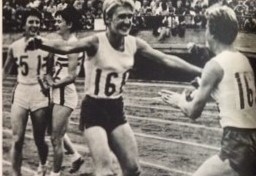
In 1964, one of the more powerful track and field teams at the Tokyo Olympics was the team from Poland. Jozef Szmidt won his second straight gold in the triple jump. Andrzej Badenski took bronze in a tough men’s 400-meter competition, and the Polish men from the 100-meters relay team took silver behind the Americans.
The 4×100 women’s relay team did even better, streaking to gold and an (apparent) world record in Tokyo. The women who ran the second leg was Irena Kirszenstein Szewinska. The then-20-year-old from Warsaw was starting a career that would carry her through five consecutive Olympiads. In that period, she captured an amazing total of seven Olympic track and field medals.
In addition to her gold medal in the 100-meter relays and a silver in the 200 meters, she was a silver medalist in the long jump as well. But she was indeed a sprinter at heart, and set 10 world records in the 100 meters, 200 meters and the 400 meter sprints.
At the 1968 Mexico City Olympics, she won her first individual sprinting gold medal in the 200-meter sprint finals in come-from-behind style. Seemingly behind 4 or 5 other runners, when she hit the straightaway, she accelerated and pulled away with ease, as you can see in the video below.
After winning a bronze medal in the 200 meters at the Munich Olympics in 1972, Kirszenstein Szewinska reinvented herself. In 1973, she began competing in the longer 400 meters, and as her IAAF Hall of Fame profile page states, “she quickly proved very adept at the new distance. The following year she became the first woman to break 50 seconds over one lap of the track.”
“My favorite event was the 200 meters because deep down I felt like a sprinter,” she said in this short video on the Polish Olympian. “My heart always belonged to sprint. Nevertheless, I always treated the 400 meters as a long spring, and that’s why I was successful at that distance as well.”

In Montreal, at the age of 30, she punished the competition, set a world record, and won her most satisfying gold medal.
“I had been running for 20 years. During that time, there were many important moments. But I suppose the most important moment of all of them was the last gold medal I won at the Montreal Games for the 400 meters.”
One of the greatest women track and field stars of the 20th century, Kirszenstein Szewinska has continued her career in sports as an administrator, including Vice-President (1995-1999) then Executive Board Member (1999-2003) of the World Olympians’ Association (WOA), member of the International Association of Athletics Federation (IAAF) Women’s Committee (1984-2007).






You must be logged in to post a comment.